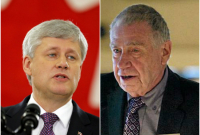Support strong Canadian climate journalism for 2025
OTTAWA — A former top aide to Prime Minister Stephen Harper was trying to help a girlfriend leave her escort past behind when he got involved in trying to persuade the government to buy water systems from a company that employed her, a court heard Monday.
Bruce Carson has pleaded not guilty to a charge of influence peddling in a trial that Harper's opponents are using to question the prime minister's judgment in making appointments.
The Ottawa court heard that Carson testified he was merely trying to help when he offered to assist an Ottawa-based company, H2O Water Professionals, in getting meetings in 2010 and 2011 with government officials.
But Crown Attorney Jason Nicol told the Ontario Superior Court of Justice that Carson wasn't some altruistic figure trying to help H2O Pros clinch a deal to sell water purification equipment to First Nations communities desperate to fix tainted water problems.
Instead, Nicol said Carson wanted to help his then-fiancee, Michele McPherson, leave her former life as an escort.
"It's all about a pretty girl," Nicol said as he read from the thick binders of evidence presented at Carson's preliminary hearing, which were formally submitted Monday as evidence at his trial.
"She's the only reason we're all in this," Carson said of McPherson in an email he sent to the owner of H2O Pros where he raised the issue of providing a commission for her.
Carson was a senior adviser to the prime minister from 2006, when the Conservatives first took office, to 2008.
The trial, which was extended until Tuesday after its start was delayed Monday, is proving to be yet another legal distraction for the Harper government as it campaigns for re-election.
In commenting on the trial at a morning campaign stop in Toronto, Liberal Leader Justin Trudeau referred to Carson as just another in a long list of dubious Harper appointments.
"Mr. Harper hasn't been very good at choosing the kind of people who need to serve Canadians with integrity and ability," said Trudeau.
The Carson case follows the trial of Sen. Mike Duffy, which forced the Conservatives off message during two weeks of campaigning in August.
The court heard that Carson indicated to H2O Pros owner Patrick Hill that he could arrange meetings with cabinet ministers and government officials to get a deal to buy water purification equipment from him.
The Crown also said Carson contacted the prime minister directly about the proposal.
Harper sidestepped questions about the trial on Monday, telling reporters in Kamloops, B.C. that the allegations are against someone who left his office long ago.
"This concerns an individual's actions as a private citizen after he left government," Harper said.
"We have set up laws to deal with that and he is being pursued and held accountable."
The Crown said that even if Carson had no real influence, he certainly pretended to have it and used it to his own benefit.
An Aug. 31, 2010 contract submitted as evidence showed McPherson was to get a 20 per cent commission on any future sales of equipment to First Nations communities from H2O Pros.
A second compensation contract signed in February 2011 saw the commission drop to 15 per cent.
Carson paid for a lawyer to draft both contracts, court was told.
Yet McPherson had "no background, no experience, nothing" in connection with water purification systems, the Crown said.
Carson told police he wanted to help McPherson put her former life as an escort behind her.
The court also heard that Carson convinced H2O Pros to pay $5,000 to buy a table at a Christmas party held by the Assembly of First Nations, but subsequently gave the money to McPherson.
Carson has denied to police that he received any compensation for his involvement with H2O Pros.
His lawyer, Patrick McCann was expected to argue Tuesday that any work Carson did was designed to influence First Nations bands to buy new water filtration equipment, and that he was not trying to influence the government.
But Nicol pre-empted that logic Monday, saying it's clear Carson and H2O Pros had direct contact with the federal department that would be paying the bills.
"Why contact (the department)?" he asked.
"Why not just approach First Nations directly?"
Terry Pedwell, The Canadian Press




Comments